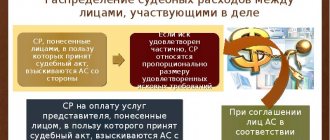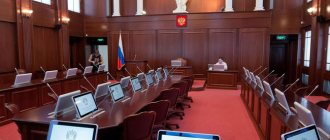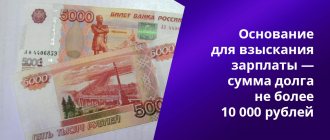We explain how to get your former lawsuit opponent to pay your legal fees.
If you win in court, you have the right to demand that the losing party return the money you spent on the case.
Technically, this is easy to do: you need to submit an application and attach several documents. The problem is that the courts very often reduce the amount that must be returned. We explain what to do so that you get back not just a few pennies, but as much money as possible.
In this article we write mainly about subsidiary courts, but our instructions also apply to other courts.
When to file for collection?
There are two strategies:
1. At the beginning of the trial.
The text of the statement of claim must include a request for reimbursement of expenses. After you win the case and the final judicial act is issued, the amount specified in the application will be returned to you.
Disadvantages of this strategy: At the beginning of the trial, you cannot know how much you will spend on lawyers. And in the application you need to indicate the amount that you have already paid - and only that (or less) will be returned.
If the trial drags on and the defendant files an appeal, you will have to pay more than you thought, and getting the money back for new expenses will be problematic. You will have to constantly look for new financial documents, certify them and attach them to the case materials.
2. Within three months after the completion of the trial
After all the steps have been completed and the final judicial act has entered into legal force, you have three months to file an application for recovery of costs.
The application must be submitted after the opponent’s time to appeal the court’s decision has expired. For example, filing an appeal is allowed within a month: wait until this month has passed, and then bring an application for reimbursement of expenses to the court.
Legal costs: concept and composition
An explanation of this concept is given by all procedural codes, in the Civil Procedure Code this is Article 88, in the APC - 101, in the CAS - 103. All of the listed regulations indicate that this type of spending consists, firstly, of state duties, and secondly, of costs.
State duty is a special tax levy collected by the state from citizens and organizations that apply, among other things, to the court to carry out a legal action (Article 333.16 of the Tax Code of the Russian Federation).
Costs in accordance with the law (Article 94 of the Code of Civil Procedure) mean the following expenses:
- necessary to pay for the work of experts, translators, and other specialists;
- related to the need for on-site inspection;
- postage;
- spent in connection with travel to the location of the court and in connection with accommodation in such a place;
- compensating for lost time;
- for the services of representatives (lawyers and lawyers);
- other expenses as decided by the court.
Payment of state duty
A mandatory element accompanying the application of a citizen or company is the payment of a state duty in the amount established by the relevant norms of tax legislation. Since the initiator of the case is the plaintiff, before filing a claim he is obliged to pay a certain amount to the budget.
Its size depends on the nature of the claim and requirements. More information on this is provided in Chapter 25.3.
NK.
In case of non-payment of this tax fee or payment in an amount that does not comply with the law, the judge, considering the received materials, has the right:
- decide to leave the application without progress to pay the required amount;
- request evidence from the plaintiff that he is exempt from paying this fee.
To determine whether a specific person needs to pay a state fee for a specific case, you need to carefully study Art. 333.35-333.37 NK.
Payment of legal fees
If no questions arise with determining the person who is obliged to pay the state fee, then when paying some legal costs, minor difficulties arise that the court has to resolve.
Situation
Civil case
Administrative case
Arbitration case
Costs of witnesses, experts and other persons claimed by the party
Expenses for witnesses, experts and other persons involved at the initiative of the court
Paid from the budget
Possibility of reduction or waiver of payment
Not directly provided
Failure to fulfill on time the obligation to pay for the work of experts and other persons
Does not relieve you from performing the obligation to conduct an examination or other work
The court has the right to refuse an application to conduct an examination or call witnesses
What documents are needed?
1. Application for recovery of legal costs
It looks something like this:
2. All documents confirming expenses for the trial
Agreement with lawyers, certificates of completed work, cash documents, hotel receipts, expense reports, boarding passes and air tickets. The more documents collected, the better.
The main thing is that the papers have legal force. For example, the court will not consider a contract without a certificate of completion of work: it is considered that payment is transferred only if this certificate is signed.
The Supreme Court prohibited the unreasonable reduction of reimbursement of legal costs
Photo: Moscow Live The procedure for determining the amount of compensation for legal costs by the court was explained by the Supreme Court of the Russian Federation in a new 130-page review of the judicial practice of the Supreme Court, the first for the current year (read about this document on Legal.Report here).
In 2021, the decision of the Nizhny Novgorod District Court, upheld by the Nizhny Novgorod Regional Court, rejected V.’s claims against the joint-stock company for the fulfillment of obligations, for the recovery of losses, a fine and compensation for moral damage.
After this, the company applied to the court to recover legal costs incurred in connection with the consideration of this civil case. The company referred to the fact that a representative of the defendant, sent on a business trip from St. Petersburg to Nizhny Novgorod, took part in the court hearings of the district court on July 20, September 8 and 14, 2021. And two representatives of the company participated in the court hearing of the Nizhny Novgorod Regional Court on December 6, 2021 to consider V.’s appeal. The duration of business trips of representatives to appear at each court hearing in the court of first instance, taking into account the distance from the place of consideration of the case, was 3 calendar days, for appearing at a court hearing in December - 2 calendar days for each of the two representatives. Travel expenses on the routes St. Petersburg - Nizhny Novgorod - St. Petersburg and St. Petersburg - Moscow - Nizhny Novgorod - Moscow - St. Petersburg amounted to 58,814 rubles, travel expenses - 10,400 rubles.
Refusing to satisfy the company's application for recovery of legal costs, the court of first instance proceeded from the fact that the company had not provided evidence confirming the validity and reasonableness of incurring costs for the travel of representatives of this company in luxury "SV" and business class cars. The court also indicated that the company’s expenses for paying travel expenses to representatives due to the provisions of Art. 94 of the Civil Procedure Code of the Russian Federation do not apply to the costs associated with the consideration of the case.
Canceling the ruling of the first instance court and partially satisfying the stated requirements, the appellate court, guided by Art. 88, 94 and 100 of the Code of Civil Procedure of the Russian Federation and the explanations contained in the second paragraph of clause 11 of the resolution of the Plenum of the Supreme Court of the Russian Federation of January 21, 2021 No. 1 “On some issues of application of the legislation on reimbursement of costs associated with the consideration of the case,” based on the excessiveness of the claims made by the company legal expenses. Based on this, the court reduced their amount to 5,000 rubles.
The Judicial Collegium for Civil Cases of the RF Armed Forces canceled the appealed ruling and sent the case for a new trial to the appellate court.
As indicated by the RF Armed Forces, according to Art. 88 of the Code of Civil Procedure of the Russian Federation, legal costs consist of state fees and costs associated with the consideration of the case. Such costs include, inter alia, travel and accommodation expenses of the parties and third parties incurred by them in connection with their appearance in court, as well as other expenses recognized by the court as necessary (Article 94 of the Code of Civil Procedure of the Russian Federation).
According to the general rule provided for in Part 1 of Art. 98 of the Code of Civil Procedure of the Russian Federation, the party in whose favor the court decision was made, the court awards the other party to reimburse all legal costs incurred in the case.
The Supreme Court indicated in which cases the statute of limitations is extended
Details04/25/2019
23938
By virtue of Part 2 of the same article, these rules also apply to the distribution of legal costs incurred by the parties in connection with the conduct of the case in the appellate, cassation and supervisory authorities.
A person claiming the recovery of legal costs must prove the fact that they were incurred, as well as the connection between the costs incurred and the case being considered in court with his participation. Failure to prove these circumstances is the basis for refusal to reimburse legal costs (Part 1 of Article 56 of the Code of Civil Procedure of the Russian Federation and Clause 10 of the Plenum Resolution No. 1 of January 21, 2021).
In accordance with the explanations set out in paragraph 14 of the resolution of the Plenum of January 21, 2021 No. 1, transportation costs and living expenses of a representative of a party are reimbursed by the other party to the dispute within reasonable limits, based on the prices that are usually set for transport services, as well as prices for services related to the provision of accommodation in the place where they are actually provided.
Thus, when resolving the issue of collecting legal expenses in the form of transportation and other costs, it is legally significant to establish the connection of these expenses with the consideration of the case, their necessity, justification and reasonableness, based on the prices that are usually set for these services.
When resolving the issue of the amount of amounts collected for reimbursement of legal costs, the court does not have the right to reduce it arbitrarily, unless the other party raises an objection and provides evidence of the excessiveness of the costs collected from it.
At the same time, in order to implement the task of legal proceedings for a fair public trial, ensuring the necessary balance of procedural rights and obligations of the parties (Article 2, 35 of the Code of Civil Procedure of the Russian Federation), the court has the right to reduce the amount of legal costs, including the cost of paying for the services of a representative, if the claim is to recover the amount of costs, based on the evidence available in the case, is clearly unreasonable and excessive (clause 11 of the Plenum Resolution No. 1 of January 21, 2021).
Since the assessment of the validity of claims for compensation of legal costs is carried out according to the general rules of civil procedural legislation, the court is obliged to reflect the results of the assessment of evidence in a judicial act. It provides the reasons why some evidence was accepted as a means of substantiating the court’s conclusions, other evidence was rejected by the court, as well as the reasons why some evidence was given preference over others (Part 4 of Article 67 of the Code of Civil Procedure of the Russian Federation).
Canceling the ruling of the court of first instance and resolving the company's claim on the merits, the appellate court, having established the fact that the applicant had incurred expenses for travel of his representatives to the place of hearing of the case and back in the amount of 58,814 rubles, payment of travel expenses in the amount of 10,400 rubles, found for society the right to reimbursement of legal costs.
At the same time, when determining the amount of costs to be reimbursed in the amount of 5,000 rubles, the appellate court, in violation of the rules of law and clarifications of the Supreme Court of the Russian Federation, did not give reasons for which it recognized the declared amount of legal costs as excessive, that is, not corresponding to necessity, justification and reasonableness, did not indicate the prices that are usually set for these transport services and other expenses associated with the consideration of the case, and also did not provide a calculation that would allow checking the correctness of the calculation of the amount of legal costs collected by the court (definition No. 9-КГ18-16).
Is there anything my lawyers can do to help me recover the maximum legal costs?
Yes. In addition to what they already have to do (collect all documents, including receipts for hotels and taxis, and sign a certificate of completion of work), here’s what will help increase the amount of expenses collected.
1. Payment by bank transfer
Even if all the documents and attachments to the documents are available, a bank statement will convince the court more.
2. Detailed list of works
Often lawyers write in the contract only the result of the work, for example, “Preparation of a legal position”, “Participation in a court hearing”.
This is faster, but the court cannot estimate the amount of work. It is better to specify all stages in the contract: “Preparation of a petition”, “Preparation of a written opinion”, “Preparation of objections”. The more stages are reflected, the easier it is for the court to assess the scale of the case.
It makes sense to indicate the cost of each stage separately.
For example, we always describe the stages of work in detail and see that this really helps clients recover large sums. Recently, for example, one of our customers returned almost all the money spent on the trial.
If you have a question about bankruptcy, subsidiarity or protection of personal assets, subscribe to the newsletter on our website. Once a month we review one request, provide detailed advice and send action instructions by e-mail. Only for subscribers.
Reimbursement of legal expenses in courts
In accordance with the norms of legislation on the territory of the Russian Federation, expenses incurred by interested parties during participation in civil procedural or arbitration proceedings are recovered.
Collection of funds is carried out only on the basis of a court decision. The obligation to pay funds is carried out by the party who, based on the court decision, is considered the loser, except in cases provided for by law.
Expert opinion
Egorov Viktor Tarasovich
Lawyer with 10 years of experience. Specialization: family law. Recognized legal expert.
Collection of funds is carried out within the period established by law. The list of expenses that can be reimbursed is open.
Legal costs for state fees
The first group of legal expenses includes state fees. The state court fee is a mandatory payment for specific, defined categories of claims.
The amount of legal costs for paying state fees is established by law; for courts of general jurisdiction it is Article 333.19 of the Tax Code of the Russian Federation; the amount of such legal costs is the same throughout the country, both for district courts and for magistrates. State duty applies to statements of claim, statements of special proceedings, appeals, cassation and supervisory complaints; issuance of a court order.
Expert opinion
Egorov Viktor Tarasovich
Lawyer with 10 years of experience. Specialization: family law. Recognized legal expert.
The state fee is paid before submitting the application to the court and is a necessary attachment to the application to the court. If the state duty is not paid, then the statement of claim is left without progress.
For claims of a property nature, the amount of legal costs for payment of state duty depends on the price of the claim. If the value of the claim increases, the state fee is subject to additional payment.
Benefits for legal costs and state fees are provided for certain categories of cases, as well as for certain categories of applicants. For example, in claims related to labor relations, for the collection of alimony, in defense of the interests of the child, as well as in claims in which the applicants are veterans and disabled people of groups I and II.
A complete list of benefits is given in Article 333.36 of the Tax Code of the Russian Federation.
The state fee is paid for all civil cases. If the state fee is not paid by the applicant when going to court, then it is paid by the other party, which is determined by the court when issuing a court ruling that resolves the case on its merits.
Who can be reimbursed for legal expenses?
The entities that are paid the funds spent to participate in the trial are primarily:
- Plaintiff;
- Defendant.
The funds are returned to these parties if the decision was made in their favor by the party with opposing claims.
In addition to these court participants, the following may be reimbursed:
- Participants who are involved in the process to confirm the evidence presented by the parties. These include:
- Witnesses;
- Experts;
- Specialists;
- Translators.
- Third parties who are involved in the proceedings because their rights may be affected by the decision. In the event that these persons submit their claims, compensation is provided if these claims have been satisfied. In the case where they do not have independent claims, costs can only be paid when a decision is made against the party whose interests were supported by these participants.








